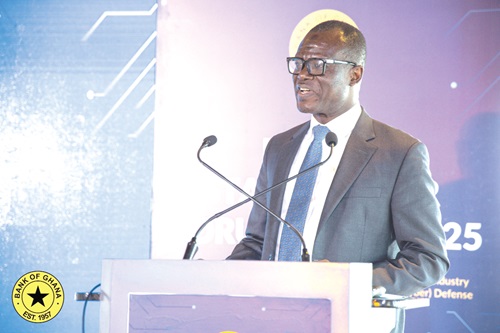The Bank of Ghana is tightening digital security measures after cyber and technology-related fraud caused losses totalling nearly GH¢10 million in 2024.
The First Deputy Governor, Dr Zakari Mumuni, made this known on May 7, 2025, during a stakeholder engagement held at the Bank Square in Accra.
He told participants drawn from financial institutions and regulatory bodies that digital fraud was becoming more complex and widespread, with both banks and mobile money operators increasingly targeted.
According to the Bank’s 2024 fraud report, cyber and tech-related fraud cases rose in both frequency and impact, with reported losses climbing from GH¢8.9 million in 2023 to just under GH¢10 million last year.
Many of the threats, the Bank said, are difficult to trace and often originate outside the country.
To address this trend, the Bank of Ghana is revising its Cyber and Information Security Directive, which was first issued in 2018.
The updated rules will reflect new risks arising from artificial intelligence, cloud computing, data protection, and digital management.
Dr Mumuni indicated that the revised directive would be flexible enough to accommodate the different operational capacities of financial institutions.
In addition, the Bank is expanding the reach of its Financial Industry Command Security Operations Centre (FICSOC).
The centre, which currently monitors and shares information on cyber threats among participating banks, will be extended to cover all regulated financial institutions.
These include savings and loans companies, microfinance firms, insurance providers, pension funds, and capital market operators.
The Cyber Security Authority has named the Bank of Ghana as the Sectoral Computer Emergency Response Team (CERT) lead for the financial industry. This designation gives the Bank responsibility for coordinating incident response and intelligence sharing within the sector.
Dr Mumuni cautioned that no financial institution can handle digital threats on its own.
“We must share intelligence, align standards, and build systems that can protect the integrity of the financial sector and the trust of those who use it,” he said.
He added that a single breach at one institution could affect others, given the increasing links between financial platforms, service providers, and regulatory systems.
Dr Mumuni also noted that the Bank wants to make basic cyber monitoring tools and warning systems accessible to every licensed institution, including rural banks and mobile money operators, to help protect customers and maintain public confidence in the formal financial system.
